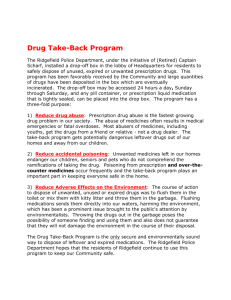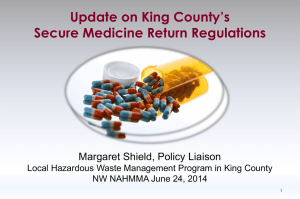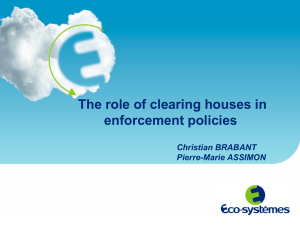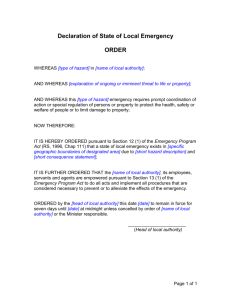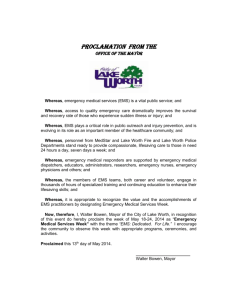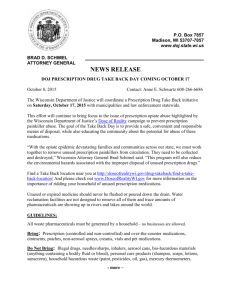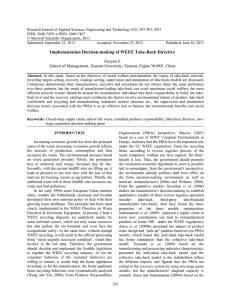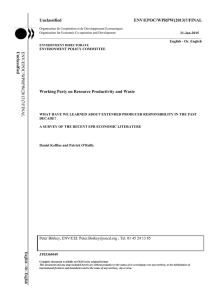Support for Drug Take
advertisement
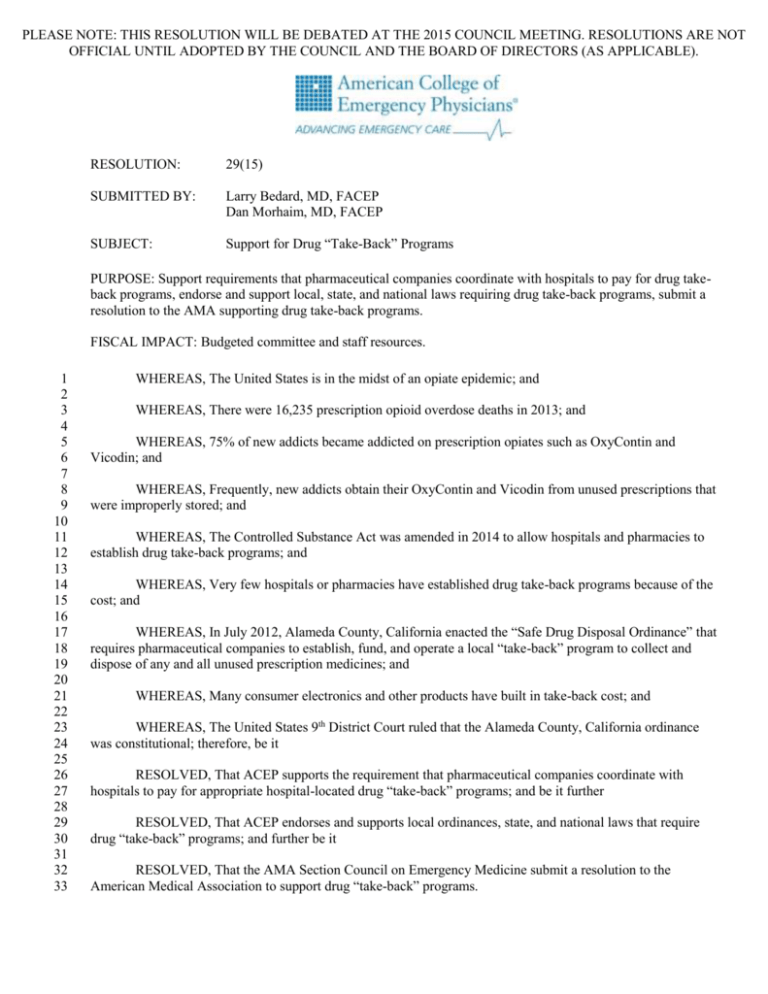
PLEASE NOTE: THIS RESOLUTION WILL BE DEBATED AT THE 2015 COUNCIL MEETING. RESOLUTIONS ARE NOT OFFICIAL UNTIL ADOPTED BY THE COUNCIL AND THE BOARD OF DIRECTORS (AS APPLICABLE). RESOLUTION: 29(15) SUBMITTED BY: Larry Bedard, MD, FACEP Dan Morhaim, MD, FACEP SUBJECT: Support for Drug “Take-Back” Programs PURPOSE: Support requirements that pharmaceutical companies coordinate with hospitals to pay for drug takeback programs, endorse and support local, state, and national laws requiring drug take-back programs, submit a resolution to the AMA supporting drug take-back programs. FISCAL IMPACT: Budgeted committee and staff resources. 1 2 3 4 5 6 7 8 9 10 11 12 13 14 15 16 17 18 19 20 21 22 23 24 25 26 27 28 29 30 31 32 33 WHEREAS, The United States is in the midst of an opiate epidemic; and WHEREAS, There were 16,235 prescription opioid overdose deaths in 2013; and WHEREAS, 75% of new addicts became addicted on prescription opiates such as OxyContin and Vicodin; and WHEREAS, Frequently, new addicts obtain their OxyContin and Vicodin from unused prescriptions that were improperly stored; and WHEREAS, The Controlled Substance Act was amended in 2014 to allow hospitals and pharmacies to establish drug take-back programs; and WHEREAS, Very few hospitals or pharmacies have established drug take-back programs because of the cost; and WHEREAS, In July 2012, Alameda County, California enacted the “Safe Drug Disposal Ordinance” that requires pharmaceutical companies to establish, fund, and operate a local “take-back” program to collect and dispose of any and all unused prescription medicines; and WHEREAS, Many consumer electronics and other products have built in take-back cost; and WHEREAS, The United States 9th District Court ruled that the Alameda County, California ordinance was constitutional; therefore, be it RESOLVED, That ACEP supports the requirement that pharmaceutical companies coordinate with hospitals to pay for appropriate hospital-located drug “take-back” programs; and be it further RESOLVED, That ACEP endorses and supports local ordinances, state, and national laws that require drug “take-back” programs; and further be it RESOLVED, That the AMA Section Council on Emergency Medicine submit a resolution to the American Medical Association to support drug “take-back” programs. Resolution 29(15) Support for Drug “Take-Back” Programs Page 2 Background The resolution directs ACEP to support requirements that pharmaceutical companies coordinate with hospitals to pay for hospital located drug take-back programs, endorse and support local, state, and national laws requiring drug take-back programs, and to ask the AMA Section Council on Emergency Medicine to submit a resolution to the American Medical Association (AMA) supporting drug take-back programs. The rising epidemic of prescription and illicit opiate drug abuse in the United States has been well documented, with public policy makers pursuing a variety of avenues to address the problem. Over the course of these policy discussions, one of the issues that has been raised concerns the lack of means of proper disposal of unused opioid medications. In addition to potential environmental issues related to improper disposal, public health experts have pointed out that the lack of means of disposal creates a quantity of these medications that are available for abuse or diversion. The U.S. Drug Enforcement Administration, citing studies showing that many abused prescription drugs are obtained “from the family medicine cabinet,” says that many Americans do not know the proper means of disposing of unused medications and end up either flushing them down toilets or throwing them in the trash. Neither holding onto these medications in medicine cabinets nor disposing of them in this manner is considered to by the DEA to be a desired practice. On September 26, 2015, the DEA held its 10th annual “National Prescription Drug Take-Back Event.” The first nine of those events resulted in the collection of more than 4.8 million pounds of drugs. Each year, the AMA produces press releases and other material supporting the annual DEA Take-Back events. The AMA has considered state based legislation on a case-by-case basis as part of its “multi-pronged approach” addressing prescription drug abuse and diversion. ACEP Strategic Plan Reference Promote quality and patient safety, including development and validation of quality measures. Fiscal Impact Budgeted committee and staff resources. Prior Council Action None Prior Board Action None Background Information Prepared by: Harry Monroe Chapter & State Relations Director Reviewed By: Kevin Klauer, DO, EJD, FACEP, Speaker James Cusick, MD, FACEP, Vice Speaker Dean Wilkerson, JD, MBA, CAE, Council Secretary and Executive Director
